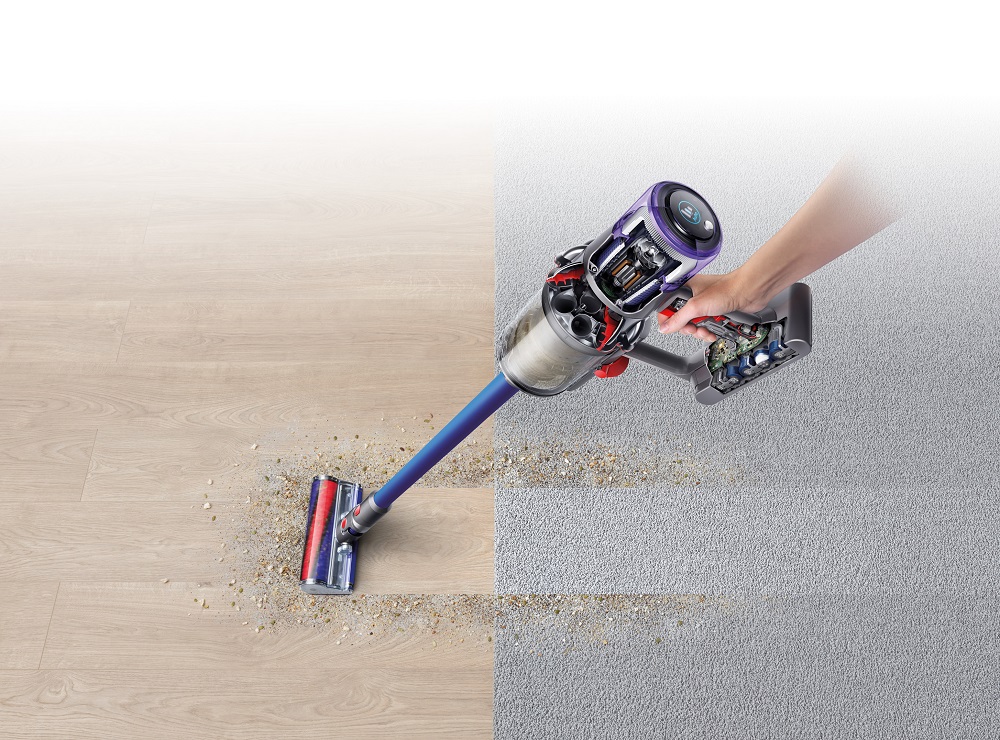Allergy sufferer? Here are 7 cleaning tips straight from Dyson's microbiologist
Suffering with a dust allergy? Remove allergens and banish bacteria from your home by following this spring cleaning plan from a Dyson microbiologist

Spring, summer, winter or fall, whatever season it is, having an allergy can make us miserable. So, if you're finding that you are more aware of the bacteria, pollen, and dust mite allergens that consume your home, read on to find out how to minimize them (and possibly be a little disgusted, sorry).
House dust mites, and their feces, which contain microscopic enzymes, are common in house dust. They feed on molds, as well as animal and human skin flakes, and flourish in textiles, such as bedding, mattresses, and upholstered furniture like sofas and carpets. There are a lot of misconceptions about how to best remove dust, and the allergens found in said dust, from your home, but, without a doubt, the best vacuum cleaner you can afford is essential.
A quality vac will pick up dust, tame the pet dander (tiny flecks of skin) that can cause allergic reactions, and – this is crucial – the best models come with an Allergy UK-approved HEPA AirClean filter which means that only clean air is released back into the air (those without the filter can release those allergens into the air again).
We'll recommend our pick of cordless vacuums to remove dust and allergens from your home, plus a weekly spring cleaning plan from Gem McLuckie, an advanced research scientist in microbiology at Dyson (you'll be surprised at how much a vacuum cleaner can do!).
Where to buy a vacuum cleaner
1. Make your bed (properly) on a Monday
Start the week by cleaning your mattress to get rid of skin flakes that dust mites might feed on. The best way to do this is by using a handheld vac to get into all the nooks and crannies, especially if you have a button and sprung bed. Then wash bedding on a 60-90°C to help break down allergen proteins. To finish your bed-cleaning routine, wash duvets and launder pillows to reduce the amount of dust mite allergen, and skin flakes present in your bed.
2. Tackle the kitchen on a Tuesday
Pending you don't have an existing food allergy, you might think your cook space is a relatively safe space, but even the tops and bottoms of cabinetry can get a bit furry if neglected.
To clean your kitchen cabinets like a pro, McLuckie advises that you remove dust from kitchen cupboard tops using a vacuum with an advanced filtration system or by dusting with a clean, damp microfiber cleaning cloth or antibacterial wipes.
Get small space home decor ideas, celeb inspiration, DIY tips and more, straight to your inbox!
Spilled spices or sauces? Go in with your trusty handheld vac to remove dust and dry debris. You'll need warm water and a detergent for anything sticky or spilled. Then, clean the refrigerator inside and out with warm water and detergent. Vacuum round the back and under the fridge freezer for a 5-star service.
3. Win the battle with allergens Wednesday
Lounging in your living room might be relaxing... Until you know what could be living on your furniture. So when it comes to cleaning (especially when you have an allergy) – don't sit on it. Cleaning upholstery is easier than you think and is a chore that should be done often (even if you don't sit with your dinner on a lap tray).
Start by vacuuming the places not regularly vacuumed, such as under the furniture. If it's been a while, you might find a dust bunny or two. Clean your couch and arm/accent chairs regularly, paying attention to the sides too; these can harbor not only large debris but also dust mites, skin flakes, and other allergens such as pollen and food allergens. Wash any cushions and coverings to reduce the level of dust caught within them.
Anything that can't be removed can be treated topically with an upholstery cleaner.
4. Take to window treatments on Thursday
Think about it, your window treatments can accumulate a hefty amount of dust. Whether you have heavy drapes or blinds, neglecting your nets (or anything else that stops passers-by peering in) can have a negative effect on your respiratory and general health, so make sure you vacuum them regularly or launder them, if possible and practical.
Remove dust from walls by dusting with a damp cloth or cleaning wipes, or using a HEPA-filtered vacuum. Dust on certain wall types can contribute toward the growth of mold; if the room is humid and not well ventilated, the dust can act as the nutrient source for the growing mold.
5. End the week on a high with clean light fixtures
If you find yourself coughing and sneezing, cleaning your light fixtures is literally a lightbulb moment... Especially if you've been diagnosed with asthma, a sinus infection, or anything ENT-related. Making sure you get rid of dust around lamps and other lighting will elevate your quality of life, tenfold.
According to McLuckie, a lot of dust can gather in lampshades and light fittings which can burn on hot bulbs producing VOCs and odor, or be moved around the room by the production of warm air around the bulbs.
Don't take for granted getting rid of grime on, in between, and behind your radiators. It's the hidden place often missed during normal cleaning. Significant dust collects behind the radiator and this can be distributed around the room by the airflow produced by the warm air from the radiator. The radiator is not hot enough to prevent bacteria from surviving and can be maintained viable in the dust contained behind the radiator.
Yes, we know, cleaning a radiator isn't the greatest way to celebrate the start of the weekend, but it means you've got everything done (and literally dusted), with nothing to do on Saturday and Sunday. Hurrah!

Jennifer (Jen) is our Large Appliances Editor on the Homes eCommerce team. Jen is constantly on the look out for the latest tech which claims to revolutionise how we wash our clothes, rinse the dishes, keep our food chilled and our floors dust-free. When she's not doing this she can be found at home in her Victorian terrace which she has lovingly (patiently) been renovating with her husband over the past few years. Jen also likes tea and homemade cake, very much.

